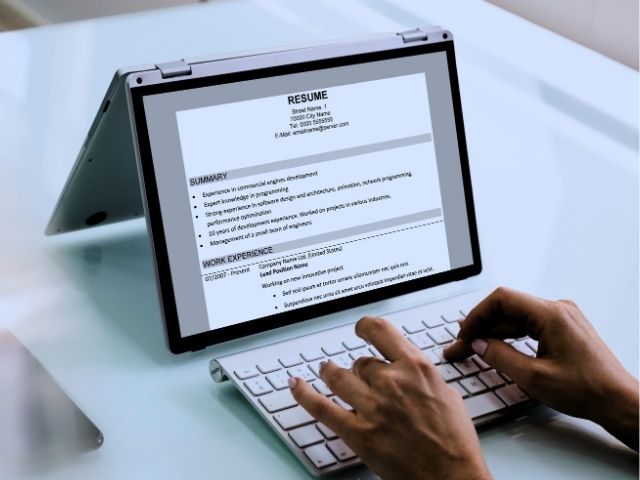Resume Sequence
Since ATS systems scan resumes and locate specific information in the correct sequence, it is suggested to use the following categories to optimize your nursing resume for ATS scanning. The sequence recommended is:
Contact Information
This is the first section of the resume. Your name should be front and center, don’t make the recruiter search for it. Make sure it’s the largest font on the page.
While there are varying opinions on the exact placement of the name, a simple, classic version in the following format is recommended:
Nursing Credentials
Your credentials should directly follow your first and last name on a resume.
City and State
It is not required for you to list your home address on a resume. Most employers don’t need this information and it is recommended not to include it on your resume as a security precaution. Please only include your city and state in the contact information of your nursing resume.
Phone Number
Make sure to indicate if your phone number is a cell phone or a landline. This is also a great time to make sure your voicemail message states your full name and is professional sounding and easy to hear.
E-mail address
It is essential to provide a professional e-mail address that does not reveal your age. Your e-mail address should include a variation of your name and some numbers if needed.
LinkedIn profile
If you have a LinkedIn profile, you should include this. Even if you don’t have a LinkedIn profile, now is the time to create one as you could be missing out on job opportunities.
Professional Summary
Your summary should be eye-catching to a potential employer and use a professional objective. This can either be a short paragraph or a bullet list listing your qualifications and providing a brief glimpse of your career thus far.
Think of your resume summary as an attention-grabbing, loaded statement that encourages your reader to continue reading. This summary is unique to you and should be targeted to a certain role.
Nursing Skills and Areas of Expertise
Your nursing skills and areas of expertise should be mentioned in the top half of the resume, there should not be a generic list of skills but a specific list. If you are a newer nurse or making a specialty change you may not have as many skills to include.
Licensure
Ensure that you list your license titles in your resume and be sure not to leave out the expiration dates. This is important because employers need to know that you are ready to start working as soon as possible.
They will be relieved to know they don’t have to wait for the licensing process. The employer will likely be verifying your nursing license online anyway since this is all public information, so you might as well include it in your resume.
History
Let employers know what you can do for them. What is the employer looking for? Do your best not to be vague with constructing your work history on your resume, this can be particularly frustrating to employers.
If you have a lengthy employment history, you may consider only including the most recent 10 to 15 years of experience. This will shorten your resume and limit the chances that you’ll encounter age discrimination. Going back too far in time doesn’t speak to your recent nursing experience because an employer’s main focus is what you can do for them now.
Adding your work history in a logical format can help your nursing resume get around the ATS systems and impress recruiters. It is recommended to use the following format:
- Job title and specialty
- Facility name
- Employment date
- Facility-specific and unit-specific information
- Primary duties and accomplishments
Education and Training
You should list your relevant degrees in chronological order. It is recommended that you list the degree or certification title first and then where you received the degree. You are not required to include your college or high school graduation dates on your nursing resume as it could reveal your age.
Nurses also do not need to include their high school diplomas on their resumes. The nursing profession requires completion of higher education and because of this, your nursing degree overrides your diploma from high school.
Awards, Accomplishments, and Affiliations
It’s not required to list these on your resume, but they will help you stand out. If you have these, it will explain who you are as a nurse to the employer. Examples of this would be if you achieved the Daisy Award, Employer of the Month, or Nursing Excellence Award.
If you belong to any professional memberships or are affiliated with a specific group related to nursing or health care add this as well. Also, note If you’ve completed any volunteer work if it relates to nursing.








